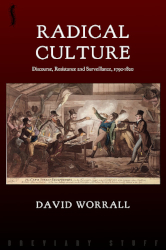Worral’s book concentrates on the period of the French revolution and the Napoleonic wars. The narrative is based mainly in London, and looks at those who wanted to replicate the French Revolution in Britain.
The main thread looks at those who believed in the work of Thomas Spence, who has largely been ignored in the mainstream history books. Spence was an ultra-radical, who saw the main problems with British society in land ownership. He wanted common land ownership, on a corporate basis, but with access for all. This radical proposal would enable everybody to be able to grow their own food, have adequate housing and access to livestock grazing. If need be, this would be achieved by physical force. The direct overthrow of the government.
During the same time, and populated by radicals enthused by Spencerian ideology, were physical force uprisings. For example a coup attempted by Colonel Despard in 1802, the Spa Fields rising of 1816. The planned, but failed, Bartholomew fair insurrection, and the Cato Street conspiracy in 1820. The latter involved a group of armed men, who were at the stage of advanced planning, to seize and execute the political cabinet. Prime minister, the lot. They were foiled at the eleventh hour, and executed as traitors. All of those involved in these planned uprisings were taking great personal risks, to change the world they lived in, and overthrow the oligarchy that ruled Britain during the height of industrial revolution.
The book is entitled “radical culture”. This is an important part of the book, and relates to the printers, booksellers, writers, and public speakers getting the revolutionary message over to the populace. Spence even produced coins for this purpose. These people also worked in the face of great risks, and many were arrested, imprisoned, had their goods seized and were transported. This leads to another important tread to the book. The spies and informants working for the government. Some of the most important and interesting snippets in the book are the reports from the spies. These first hand reports have to be taken with a pinch of salt by the historian. As the informers worth to the government handlers would increase, in line with the possible danger to the status quo that was posed. Therefore, a large amount of embellishing would be regular. However, many a radical was seized due to these grasses working within movements, whilst they pretended that they had the same views, and had ingratiated themselves with the revolutionaries. The problem was obvious. The radical movements were supposed to be for the many, growing into mass movements. As the populace awoke from their slumbers, and seized control of the land, the economy, the state and eventually their lives. Even as direct action was planned in small groups, as with Colonel Despard and the Cato Street conspirators. They were not safe from prying eyes and ears, and reports were made. Same as today with the spy cops, and blacklisters.
All in all, a very good book. Once again delivered by Breviary Stuff Publications, who are at the cutting edge of reclaiming our history, and the retelling of our struggles. One very interesting point to make in relation to contemporary struggles, is the Spencian philosophy of land ownership. If Tommy had been successful, we would have environmental protections we can only dream of. Furthermore, we can only hypothesise on the success of this philosophy taking hold in other countries, if it were successful here. The Empire could have followed. If this had of happened, not only would we be living in a better world, with food production for all. But school children would not have to strike from their school education, against capitalist corporate greed destroying the environment for profit; and seriously threatening our children’s future lives.
Buy this book, read it, and get angry.
Steve Mills
Bristol Radical History Group June 2019.





